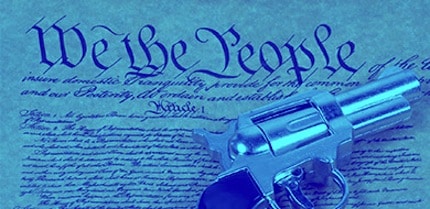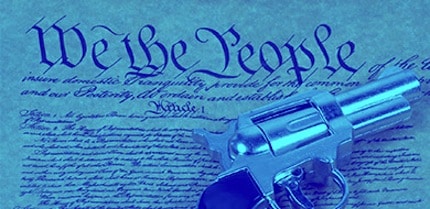Ken Womble has written convincingly regarding legal matters, including the desirability of prosecuting cops who lie about other cops’ killings. However, Womble, in a Monday Mimesis Law article, provides several not-so-convincing arguments for repealing the Second Amendment of the United States Constitution while keeping in place other constitutional provisions Womble lists — “freedom of speech, assembly, due process, voting, etc.”
Womble provides three arguments in support of his conclusion. First, he says that the right to keep and bear arms is distinguishable from other rights mentioned in the Constitution because, “[i]n our nation’s almost 240 years of existence, the 2nd Amendment is the only time our leaders have granted a constitutional right to possess tools.”
When you think about it, this is not much of a distinction. The freedom of speech that Womble seeks to distinguish from the right to bear arms would be of much less value without the ability to use microphones, telephones, video cameras, audio recording equipment, radio and TV, the internet, means of transportation, and many other tools. Indeed, listed rather redundantly in the First Amendment is the freedom of the press along with the freedom of speech. A major tool of the press is the printing press and its modern analogues such as a computer providing word processing, video editing, and website posting capabilities. Say you print your communication on paper, then you can use additional tools, such as trucks to transport the printed communication and distribution bins from which people can pick up the printed communication.
Tools do not play a major role in the exercise of only the freedom of speech and its cousin the freedom of the press. Tools also permeate the exercise of the other rights Womble lists. Assembly uses the tool of a suitable room in which people can meet, along with other tools including microphones, loudspeakers, chairs, and tables. And the tools of speech and press can be used to alert people about a future assembly or about what occurred at a past assembly. Due process would be tough if a defendant were deprived of access the tools with which to conduct legal research and to draft and submit legal briefs. Imagine voting without any tools — no ballots and voter rolls, for example.
Meaningful protection of many rights listed in the Constitution requires that the US government refrain from depriving people of the use of tools that facilitate the exercise of those rights. Thus, the fact that the Second Amendment specifically lists a tool — “arms” — provides a rather insignificant distinction between the Second Amendment’s declaration that the right to keep and bear arms shall not be infringed and other rights-protecting provisions in the Constitution.
The second argument Womble presents in favor of repealing the Second Amendment is that the use of guns may not be effective in fighting against the US government or in providing personal security. Womble presents some arguments in favor of this conclusion. But, it is obvious that the same sort of arguments could be used to criticize the practicality of the other constitutional rights Womble lists. “Freedom of speech, assembly, due process, voting”: How are those rights practically working out in helping individuals fight back against the US government and protect themselves? You can talk, assemble, and vote all you want, but the government can just continue to amass more power at the expense of your liberty and a bad guy can still beat you up or kill you.
Due process may help you some — to the extent is actually observed. But, the government has outlawed many nonviolent and victimless activities, penalties are often very high, and police and prosecutors have virtually unlimited resources stacked up against your limited cash flow. Just taking a plea bargain can make a lot more sense than rolling the dice on your day in court. Even if you receive all the due process you are due and you are innocent, the judge or jury may find the prosecutor’s arguments more convincing than those of you or your defense lawyer.
Is it really less practical to place your trust in the government giving you all the protections of due process if you are an investigated individual or a criminal defendant than it is to place your trust in your skill with a gun should you find yourself confronted by someone seeking to kill or severely injure you? In the former instance, you would be exercising faith that other people will treat you right. Yet, the interests, pecuniary and otherwise, of people you will be relying upon are likely not aligned with yours. In the latter instance, at least you have some direct control over how events play out.
Third, Womble argues that repealing the Second Amendment — and eliminating any restraint it places on the US government — does not endanger other rights by diminishing the sanctity of the Constitution. If you accept Womble’s assertion that the right to keep and bear arms is not a real right, then this makes sense. His conclusion may then be as commonsensical as saying that the repeal of alcohol prohibition from the Constitution, which Womble suggests is analogous, did not endanger constitutional rights or diminish the sanctity of the Constitution.
But, the right to keep and bear arms is a right because it is included in an individual’s right to defend himself and others. Womble’s suggestion that the use of arms for this purpose may often not be effective is beside the point. So also is Womble’s observation that people use guns to commit suicide. Such occurrences do not negate that people have a right to use defensive force. Some people will fail in their use of defensive force. But, that is consistent with what rights are all about — the freedom to act irrespective of if the action achieves a desired objective or not.
The right to act comes with the prospect of success or failure. This is true with the right to keep and bear arms just as it is with other rights such as the right to speak. It is in tyranny that you are allowed to act only in ways that have been determined to yield “good” results.
Womble’s arguments for repealing the Second Amendment, in addition to being unconvincing, would, if applied more broadly, call for the US government disrespecting the other constitutional rights Womble lists as well.


